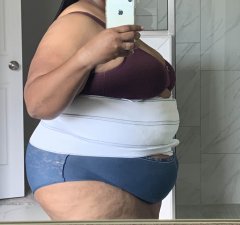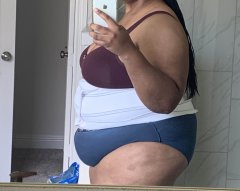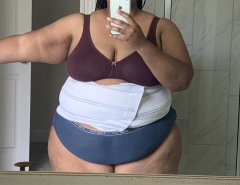Search the Community
Showing results for '경상남도외국인출장만남[카톡: po03]『goos20.c0m』모텔출장콜걸출장안마Yⓛ♦2019-01-19-10-29경상남도✌AIJ☢출장소이스출장아가씨출장샵추천┝출장샵안내1오피△경상남도'.
Found 17,501 results
-
I'm sleeved and I do it. I don't have my first meal until 10 am (protein shake), a small meal at noon, a jello cup at 2 pm, another shake at 4 pm and my dinner @ 6 pm. Then I really don't have anything after six. Sometimes a 15 calorie sugar free popsicle or two as needed.
-
A little frustrated right now with my weight loss slowing/stalling for a long time. I am just starting soft foods and don't think I have broken 600 calories in a day yet. Had the surgery on June 8th, exactly four weeks ago. I had lost 27lbs on the liquid diet (they make us do it for 3 weeks at my clinic), then the first time I weighed myself 10 days after surgery I had lost another 16lbs. In the 18 days since then, 4lbs... with a 10 day complete stall in the middle. I had read that it can happen, I was pretty dehydrated after the surgery and apparently your liver needs to get back to normal size after the liquid diet and that adds some weight. I know it is mostly mental, but with eating so little, I kind of expected a pound a day early on like this. I try to tell myself that if I hadn't been weighing myself and if you had told me that one month out from surgery I would be down around 20lbs, and about 50lbs total including the liquid diet period, I would have been fine with it. Just closing in on 3 weeks with really modest weight loss is discouraging. I really want to break that 300lb barrier for some motivation.
-


Celebrating 1 year journey, 100lbs down
BayougirlMrsS replied to bhrobins's topic in Tell Your Weight Loss Surgery Story
Congrats on the awesome job. be prepared for everyone to start telling you ...... You need new clothes.... My first time around (banded 2009) i shopped a lot at second-hand stores.... It was a very smart move. Got down to a size 6 and stayed there for years. So i bought "good" stuff and wore them for years. Then i lost my band in 2017 and put on 30lbs over the next 2.5 years.... Sleeve 8/28/19 at 173lbs. Now those size 6 that i'm so glad i didn't get rid of are too big... so now i'm slowly but size 2's and 4's. Today's weight 125 and holding. -
I had my surgery when I was 55. I always say I should have had it years ago, but to be honest, I'm not sure I was in the right frame of mind to do it years before. It takes A LOT of work and commitment to be successful, and you have to be in the right mindset to do it. I ended up losing 100% of my excess weight. I don't think I would have been nearly as successful if I'd had it 10 or 20 years earlier. and btw - a lot of us have the surgery in our 50s and 60s - and we occasionally even see someone in their 70s. So you're in good company!
-


3yrs out gastric sleeve and gaining weight
Gorgonio replied to Kira2020's topic in Gastric Sleeve Surgery Forums
So your BMR is very low now after all the weight loss. BMR is the base of calories your body burns in a day without any workouts for example just from sitting around. My BMR is 1200 calories. It's super low. So if I eat 1300 calories in one day. I'm going to gain about a pound in a month from to many calories. Thays why you should really be walking atleast 10 thousand steps a day and eating at your BMR to loose weight. -

Day of Surgery
ladyscorpion04 added images to a gallery album in Before and After Gastric Sleeve Photos
-


July 2020 Surgery anyone?
Pandemonium replied to IWantTheDream's topic in PRE-Operation Weight Loss Surgery Q&A
First day of bowel prep and 24 ounces in and I am regretting all of my life choices. I made the choice to not add Crystal Light to the Golytely and think I made a mistake. I was concerned about ruining Crystal Light for me for life if I did it The lemon flavor packet the pharmacy included is not even remotely sufficient. Also, my lap band is making this process take longer because I can't do 8 ounces every 10 minutes. Oh...and this is officially my worst birthday ever. -


Second Day on Soft Diet Doing Okay
HLMaciejeski06172047 posted a topic in Gastric Sleeve Surgery Forums
This is my second day on the Soft Diet and so far so good except I threw up yesterday because I did not listen to the signal my body was giving me regarding Breakfast, which is that I should have just stuck with just the 1 egg Scrambled egg and not try to eat some fruit (1/4 cup) afterward. I AM doing better today and everything is staying down. Before the surgery I was on the Liquid Diet for 1 week drinking Carnation Breakfast Essentials Light Start (5 packets, 5 cups 2% milk and 1 Tablespoon Whey Protein Powder) everyday getting 40 oz of that in and 24 oz from drinking either Water or Crystal Light. And doing that once I got home on June 19, 2020, when I was asked to get in 8 oz of liquid within 45 minutes of being home and continue the Liquid Diet until June 27, 2020, when I started the Pureed Diet that that went okay for me as well as the Liquid Diet except kind of getting tired of everything being chocolate (because they only have chocolate Carnation Breakfast and Protein Powder at the store near where I live) and to think I am a chocolate lover getting tired of having something that is chocolate. Exercise so far has been walking around the apartment, walking around the neighborhood some, walking to the store or pharmacy from where I live and climbing stairs to do Laundry since I have been home from surgery even though I make sure that I do not lift no more than what I am allowed to lift and not pushing myself when I am starting to tire out from walking. -


BMI 38.6 225 pounds 5’2
ms.sss replied to Thicc chick 504's topic in PRE-Operation Weight Loss Surgery Q&A
Totally doable. Im sleeved, the same height as you, and almost same starting weight (I was 10 lbs heavier at 235 lbs). My doc said it would be considered a wls success if I got down to 170...I’m 115 today. Stick to your plan, it can be done. P.S. On a side note, at 225lbs and 5’2”, your BMI is actually 41.15 -
Booked for bypass on August 10. Much sooner than I thought. I only really started seriously considering surgery two months ago. 😮
-


Metallic Taste in my Mouth
Dee.Lams replied to Dee.Lams's topic in POST-Operation Weight Loss Surgery Q&A
Yikes! I guess it’s a small price to pay. I’ve lost 24 pounds this month and I’m just 10 away from entering onederland so no complaints here 😆 -


Your Weight Matters Convention & Expo
PollyEster posted a topic in General Weight Loss Surgery Discussions
This excellent annual conference is available for free online for everyone this year because of the pandemic. Great opportunity to learn from experts in obesity and bariatric surgery, thanks to the Obesity Action Coalition. Online registration details are here. Event Details The Obesity Action Coalition (OAC) is excited to announce that our 2020 Your Weight Matters Convention & EXPO has been transformed to YWM2020 – VIRTUAL! Once again, YWM will be bringing together the most sought-after health and weight industry experts to present science-based information in an easy-to-understand format, designed to help attendees navigate the complex topic of weight management…. all easily at your fingertips in a VIRTUAL PLATFORM! YWM2020 – VIRTUAL is offered as a FREE virtual event series that is crafted with a one-of-a-kind program designed to help individuals seeking answers about their weight and health. This year’s virtual program will allow you to dive into the science behind weight, while learning key strategies and gaining access to valuable tools. If you’ve simply wanted the answers as to why weight can be such a struggle, then YWM2020 – VIRTUAL is an event you won’t want to miss! Events Program Agenda and Schedule Click here to view the full schedule. Event Dates Event 1: Saturday, July 11 1:00 pm – 3:00 pm EST/10:00 am – 12:00 pm PST Event 2: Saturday, July 18 1:00 pm – 3:00 pm EST/10:00 am – 12:00 pm PST Event 3: Saturday, July 25 and Sunday, July 26 1:00 pm – 4:00 pm EST/10:00 am – 1:00 pm PST- 2 replies
-
- obesity
- conference
- (and 5 more)
-
48yr Male, 5/18/20 VSG HW 382, SW 309, CW 282, GW 240/225 First visit to the nutritionist was 7/3/2019. Had a long pre-op program then was delayed by COVID-19, so wasn't sleeved until 5/18/20. Lost 73# pre-op, 27# since - for a total of 100! Excited to hit this goal, and only have about 42/57 lbs left to meet my first and second goal. You can do it, stick to the program, Proteins + fluids, you know the drill.
-


Celebrating 1 year journey, 100lbs down
bhrobins posted a topic in Tell Your Weight Loss Surgery Story
48yr Male, 5/18/20 VSG HW 382, SW 309, CW 282 First visit to the nutritionist was 7/3/2019. Had a long pre-op program then was delayed by COVID-19, so wasn't sleeved until 5/18/20. Lost 73# pre-op, 27# since - for a total of 100! Excited to hit this goal, and only have about 40-60 lbs left to meet my first and second goal. You can do it, stick to the program, proteins + fluids, you know the drill. The second pic isn't great - I'm about to have to retire another size of shirts in the next few weeks. -


Day 6 of 14-day preop diet and freaking out
PolkSDA posted a topic in Tell Your Weight Loss Surgery Story
... but not for the reasons you might think. I questioned whether I should make this post in the preop section or here, but since it's my first post on the forum, it might as well serve as an introduction as well. My apologies in advance for the verbosity, as I have a tendency to ramble. At age 54, I've been morbidly obese since I was a teen. I have no personal frame of reference as to what it means to be fit or eat healthily. Sure, there's the cognitive recognition of what those concepts are and what they should mean, but nothing in my own life experiences that are relatable. I'm 6'1" and at my heaviest weighed 410. Five years ago I was diagnosed with high blood pressure, which medication has fortunately kept under control. In June of 2019, when I weighed 385, I was diagnosed with Type 2 diabetes. It was at this point, that I realized I actually needed to do something about losing weight beyond paying lip service. I've been feeling it more in my knees and ankles the last few years, and the notion that should I ever need a knee replacement or other major joint surgery, that I would likely be denied due to my weight wasn't an enticing prospect. I've made token efforts at points in my life to dieting and exercise, but nothing consistent; nothing that "stuck". So I spoke with my primary physician about bariatric surgery options and started down this road. After consultations and doing my own research, I decided on the sleeve gastrectomy. Over the several month "trial period" (not sure what the technical term is), meeting with dieticians, the surgeon, the psychologist, etc., my surgery was approved and scheduled for mid April of this year... well, you can guess what happened. Thanks to COVID-19 everything was put on hold. I freaked out a bit at that point. My work schedule is such that certain times of the year are no-go as far as being away for extended periods. What if my recovery takes longer than expected? What if due to the quarantine and stress eating (believe me, it's a thing), I gain weight again and they kick me out of the program? Having all this uncertainty on top of all the uncertainty going on in the world... being in a high-risk group for COVID, the business I work for having to completely retool how it does business, the financial market crash (at the time), the civil unrest in an election year, etc.,put my head in a not very happy place. I'm also stressed by the fact that I have no immediate support structure in the event things go wrong (either medically or if I slip with respect to eating habits). I have no family, no significant other, and I live alone. Under normal circumstances, I'm perfectly fine and dandy with all three of those things, but for the first time in my life, I'm faced with the prospect of not having support when I might need it. I've never head surgery in my life, outside of two colonoscopies, which all things considered, I've been blessed in that regard, but again I have no frame of reference of what to expect and what to do in the event things don't proceed as planned. I've avoided reading many of the threads here simply because I don't want to read about worst-case scenarios, as I know that my mind will tend to drift there, and I don't want the negatives of what *might* happen to dominate my thoughts right now. So back to the present... at the beginning of June things started to open back up in the state, at least as far as allowing elective surgeries to be back on the docket. I'm scheduled for surgery on July 13. The 14-day preop diet (which I started on June 29) that my hospital prescribes is more restrictive than many others. No meat in addition to no carbs or fats. It's a 1000-1150 calorie per day diet. As someone who normally would eat 3000-5000 calories per day, that's effectively a snack. So I'm in the middle of day 6... and everything is fine. And I have no idea why. I *SHOULD* be frothing at the mouth, hangry, threatening to eat the neighbor's cats, etc., but for some reason I'm not hungry at all, and this cognitively makes no sense to me based upon my "normal" eating habits. I've been actually eating less than 800 calories per day, not even up to the recommended 1000-1150 calories. Breakfast: protein shake (30g protein, 140-160 calories depending on brand) Morning snack: Yoplait light yogurt (90 calories) Lunch: 12-oz pouch of steamed vegetables with garlic and pepper (80-140 calories depending on what mix I use) Afternoon snack: apple slices (50-80 calories) Dinner: Another protein shake (140-160 calories) Evening snack: another yogurt (90 calories) I'll mix in sugar-free jello (5 calories) throughout the day or some celery sticks as needed, and if feeling peckish will do an extra pouch of steamed vegetables. What's freaking me out is why I'm not freaking out... if that makes any sense. It shouldn't be this easy, and I worrying that I ma be lulling myself into a false sense of security/complacency. Or is my brain somehow making this easier on me, as somewhere deep down in the depths of my subconscious I fundamentally realize that I *have* to make this work? I don't know; it's hard to convey. I was at 351 on Sunday prior to starting the diet (and yes, I pigged out on Saturday and Sunday knowing what was ahead) and am now down to 339 as of this morning, which is a good thing. Just trying to get a handle on why my brain is operating the way it is... At any rate, good to be aboard. -
I am 19 days away from surgery!! I have my endoscopy on Thursday. I’m so afraid of pain. What was your pain level? Were you in much pain? This will be my first surgery & my first time under anesthesia.
-


Do you see yourself as thin yet?
PollyEster replied to JRT Mom's topic in General Weight Loss Surgery Discussions
There are *many* evidence-based clinical bariatric surgical and nutrition guidelines available to health care professionals. They are updated regularly based on the quantity and quality of the best available scientific studies. I’m attaching just one example here: it’s the most recent (2019) guideline provided by the American Association of Clinical Endocrinologists, The Obesity Society, American Society for Metabolic & Bariatric Surgery, Obesity Medicine Association, and American Society of Anesthesiologist (and endorsed by the American Society for Nutrition, American Society for Parenteral and Enteral Nutrition, International Federation for the Surgery of Obesity and Metabolic Disorders, International Society for the Perioperative Care of the Obese Patient, and Obesity Action Coalition). In my experience at the intersection of biology and medicine, I've observed that eminence-based medicine tends to be the rule, not the exception. Medicine functions in the gulf between ideas/beliefs and science. Science is based on doubt. Medicine is a road built upon a foundation of good ideas and beliefs put into practice, but it is also a road literally paved with the cadavers of every good idea and belief that didn’t pan out. Even when they do pan out, they still need to be meticulously studied and regularly verified and updated to determine precisely how, why, and which patients benefit the most and the least. The results are not straightforward because bodies are not straightforward: there are incalculable external/environmental variables that are constantly in flux colliding with incalculable internal/genetic variables that are constantly in flux. I don't know any good scientist or clinician that wouldn't trade everything they know for everything they didn't know in a heartbeat. All researchers and practitioners, including bariatric clinicians, should ideally continually examine and assess their own results, making changes where and when necessary, to ensure they are delivering the best outcomes for their patients. Even though this inevitably leads to variations in form -- but not function -- it's just good medical practice. Clinical Practice Guidelines for the Perioperative Nutrition, Metabolic, and Nonsurgical Support of Patients Undergoing Bariatric Procedures 2019 Update.pdf -


Please help me figure out surgeries!
PollyEster replied to Jessa4140's topic in General Weight Loss Surgery Discussions
You have difficult decisions to make and it’s completely understandable that you’re obsessing about all of it – how could you not? I, too, am a strong advocate of the “think a million times, cut once” philosophy. With regard to being a pioneer patient, from extensive research conducted prior to my own bariatric surgery, and as a medical scientist, please allow me to offer an assessment: no surgeon would select a ultra-low or even low-volume surgeon for him-/herself or his/her relatives for any surgery. The correlation between high volume and quality of surgical outcomes is empirically well documented, meaning that the outcome of every surgical procedure is directly dependent on the number of operations performed at a given hospital as well as by the designated surgeon. In other words, the higher the number of operations of a specific type a surgeon performs, the more likely optimum treatment results and low complication rates are achieved. This fact is supported by a large volume* of studies and meta-analyses that have been conducted, peer-reviewed, and published between 1979 and 2019. Because of comorbidities and lower cardiopulmonary reserve thresholds, bariatric patients are often high risk patients. In complex procedures like bariatric surgery – and particularly with riskier procedures such as RYGB, BPD/DS, and SIPS – it is worth paying extra attention to the correlation of procedure-specific skills of the surgeon and the complication rate. Since you’re several months away from surgery, I’d encourage you to keep researching extensively, and talk with as many people as possible who have recently had DS and VSG, and particularly those who are at least 5 years out from both surgeries. I hope that by the time you reach a final decision, you’re able to do so with clarity and a sense of ease. Wishing you all the very best! ****** *A small sampling of available data includes: 1. Zevin B, Aggarwal R, Grantcharov TP: Volume-outcome association in bariatric surgery: a systematic review. Ann Surg 2012;256:60-67. 2. Nguyen NT, Paya M, Stevens CM, Mavandadi S, Zainabadi K, Wilson SE: The relationship between hospital volume and outcome in bariatric surgery at academic medical centers. Ann Surg 2004;240:586-593; discussion 593-594. 3. Birkmeyer NJ, Dimick JB, Share D, Hawasli A, English WJ, Genaw J, Finks JF, Carlin AM, Birkmeyer JD; Michigan Bariatric Surgery Collaborative: Hospital complication rates with bariatric surgery in Michigan. JAMA 2010;304:435-442. 4. Birkmeyer JD, Finks JF, O'Reilly A, Oerline M, Carlin AM, Nunn AR, Dimick J, Banerjee M, Birkmeyer NJ; Michigan Bariatric Surgery Collaborative: Surgical skill and complication rates after bariatric surgery. N Engl J Med 2013;369:1434-1442. 5. Chowdhury MM, Dagash H, Pierro A: A systematic review of the impact of volume of surgery and specialization on patient outcome. Br J Surg 2007;94:145-161. 6. Luft HS, Bunker JP, Enthoven AC: Should operations be regionalized? The empirical relation between surgical volume and mortality. N Engl J Med 1979;301:1364-1369. 7. Birkmeyer JD, Siewers AE, Finlayson EVA, Stukel TA, Lucas FE, Batista I, Welch HG, Wennberg DE: Hospital volume and sugical mortality in the United States. N Engl J 2002;346:1128-1137. 8. Amato L, Colais P, Davoli M, Ferroni E, Fusco D, Minocci S, Moirano F, Sciatella P, Vecchi S, Ventura M, Perucci CA: Volume and health outcomes: evidence from systematic reviews and from evaluation of Italian hospital data (Article in Italian). Epidemiol Prev 2013;37(suppl 2):1-100. 9. Pieper D, Mathes T, Neugebauer EAM, Eikermann M: State of evidence on the relationship between high-volume hospitals and outcomes in surgery: a systematic review of systematic reviews. J Am Coll Surg 2013;216:1015-1025. 10. Al-Sahaf M, Lim E: The association between surgical volume, survival and quality of care. J Thorac Dis 2015;7(suppl 2):152-155. 11. Maruthappu M, Duclos A, Lipsitz RS, Orgill D, Carty MJ: Surgical learning curves and operative efficiency: a cross-specialty observational study. BMJ Open 2015;5:e006679. 12. Schrag D, Panageas KS, Riedel E, Cramer LD, Guillem JG, Bach PB, Begg CB: Hospital and surgeon procedure volume as predictors of outcome following GI resection. Ann Surg 2002;236:583-592. -
Hope you had your surgery and are recovering nicely. My surgery was rescheduled twice due to covid-19, and am now slotted in for August. It's been very stressful, but on the plus side there's a lot of pre-op weight loss due to multiple liquid diet adventures...
-


13 Years Post Surgery and starting to gain weight.
summerset replied to Gallerygal's topic in General Weight Loss Surgery Discussions
Hm, I had my first surgery in 2001. I don't know though if my weight would be different if I didn't have these intolerances and complications. If you maintained for 10 years - do you have any idea what caused the weight gain? Like having a new job and being less active or entering retirement or something like this? -
According to his profile he had the Bypass in Oct 2019 as his first surgery. No one can understand this revision stuff unless they have been through it. Wishing you all the best
-


Those who have lost 100% EBW esp. those vets who kept it off- what's did you do?
NYJenn replied to Suzi_the_Q's topic in PRE-Operation Weight Loss Surgery Q&A
I lost 130+ pounds (surgery was 7/10/18) and I’ve stuck to my lifestyle meal plan. I can’t eat sweet things anymore, they taste terrible to me. I drink a gallon of water a day, exercise 4-5 times per week and stopped using food as comfort -


Those who have lost 100% EBW esp. those vets who kept it off- what's did you do?
PollyEster replied to Suzi_the_Q's topic in PRE-Operation Weight Loss Surgery Q&A
I began the WLS process 16 months ago at 292lbs. I lost 50 lbs during the 6 month wait for surgery by following a 1100 kcal/day whole-foods plant based lifestyle (which I'd already been following for over 6 years), and exercising at least 150 minutes per week (beginning with daily yoga and simply walking as far as I could each day, slowly working up to 10,000 steps/day and adding weight training, cycling, hill hiking, and indoor rowing). After surgery, I reached my goal weight in 7 months, and am continuing to lose rapidly without the slow-down that is commonly experienced at the 6 month mark. Currently, I have lost not only 100% of my EBW, but 58% of my entire body weight. I now expect to reach the weight I was in high school, 112-114 lbs, and to maintain long-term in the 115-120lb range. The rapid loss window after surgery is finite: only about 6 months. How much weight one loses in those 6 months is primarily determined by genes, but all gene expression is dependent upon environmental variables, so I did everything I possibly could to maximize loss during that time. For me that meant: protein first veggies second; eating only nutrient-dense whole, clean, plant-based foods (meaning no processed or packaged foods, no animal products, no nutrient-poor foods); staying hydrated; waiting 30 mins before and 45 mins after drinking to eat; consuming no more than 600-800 kcal/day; practicing portion control; being mindful while eating and chewing food extremely well before swallowing; no snacking or grazing or emotional eating; weighing and tracking all food; taking all of the required vitamin and mineral supplements; weighing myself daily; using a fitness tracker and logging all exercise; exercising upwards of 15 hours per week (because I really enjoy it; I never had to force myself); meditation; taking good care of my emotional and mental health, and sleeping 8 hours minimum per night. I still do every single one of these things, except now I eat more (not too much, but enough to healthfully support my activity levels) and exercise more (upwards of 25 hours per week training for eventual distance cycling and triathlon events, as well as many other sports including weight training and squash especially). Though it's all just my regular, everyday, normal life now, I'm still only 8.5 months out from surgery, so it’s all relatively effortless. I'm fully committed to doing all of these things for the rest of my life, however. I will *never* forget how disabled I was -- how limited I was, and how limited my life was -- because of morbid obesity. Edited to add: According to several bariatric experts that I've spoken with, the "honeymoon stage" basically ends when people resume some or all of their old habits: making poor food choices, eating too much, not exercising, and not following evidence-based best practices for long-term weight loss and maintenance (based on observing 5 and 10 year outcomes for hundreds of thousands of bariatric patients). Obesity is a disease and WLS is a treatment, not a cure. If you have heart disease and undergo a triple bypass but start eating burgers and fries again 6 months after surgery, you’re still going to die of heart disease because you’re not addressing the underlying cause of disease unless you change your diet and lifestyle. 50%-60% average weight loss after VSG is just that, an average. So if you don't want to end up with average results over either the short or long term, then definitely do not do what the average person does. Use the first year after surgery to entrench yourself in an entirely new way of eating and moving your body (including weight bearing exercises to build muscle), regularly examining what's working and what isn't, and adjusting or pivoting as needed over time to continue seeing the desired results. -


What's healthy range for Carbs after WLS?
BriarRose replied to Puffy-no-more's topic in POST-Operation Weight Loss Surgery Q&A
I am 10 years out. Lost 140 pounds. In last 5 years gained 40back. Life happens. In the last year I have lost 36 of those pounds. How ? Back to basics. Protein - I grill fish or chicken or beef. Portion it up - then I make lots of vegetables - fresh riced cauliflower brocolli carrots and chop in onions or garlic fresh herbs steamed and then a quick sautéed in olive oil - meals for lunch and dinner for a few days. Hot cold - over salad - add stir fry veggies to that .... filling and all healthy. My carbs come from the veggies and fresh fruit. I also will have a daily treat that I don’t count - as anything. One skinny cow ice cream or a piece of chocolate - 2 little dove bites are heaven. And I am in control !!! Intentional eating. -


Please post GS weight loss for first 3,6 12 months?
Arabesque replied to Tim C's topic in Gastric Sleeve Surgery Forums
At 30 days post surgery I was 9kg down from my surgical weight. At 3 months I was 16kg down. At 6 months I was at my goal of 60kg. At 10 months I’d lost another 9kg and have maintained between 50 & 51kg for the last 3.5months. That was my journey. Yours will be different because of all the factors @catwoman7 mentioned. Best advice is don’t compare your rate of loss with others. For every fast loser there’s a slow loser. If you’re determined, focussed & willing to make long term changes you will be successful. I’m very glad I had the sleeve surgery & I hope you will be too. Good luck.













